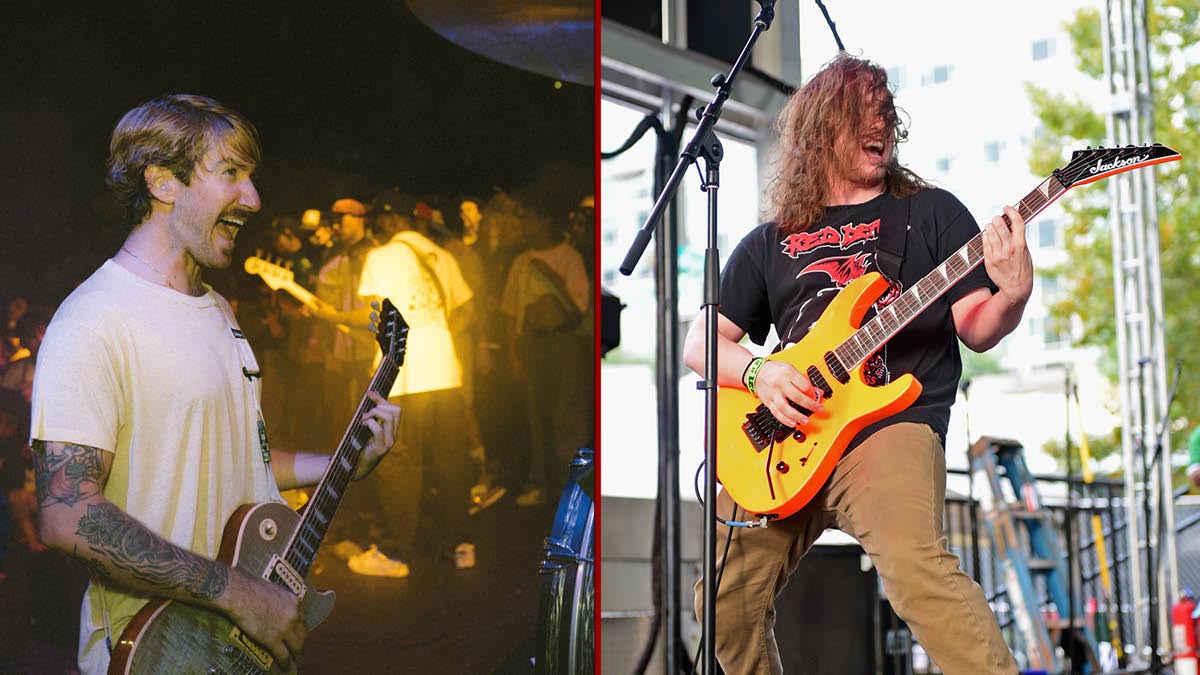Turnstile’s Brady Ebert and Pat McCrory on why huge guitar groove is front and center of their hardcore punk sound
Glow On sees the Baltimore quintet take their metal-influenced punk into new, thrilling directions and is animated by a fierce rhythm guitar tone

Hiring a brand-name producer like Mike Elizondo, a former protégé of Dr. Dre whose résumé includes decidedly non-guitar artists like Eminem and Fiona Apple, could have led hardcore heroes Turnstile down a much different path for their latest album, Glow On. But co-guitarists Brady Ebert and Pat McCrory instead found a kindred spirit who shared their language of riffs and tones.
“We would give him a vague description, like it needs to be punchy, [or] maybe describe it with hand motions, and he’d be like, ‘Oh, I know exactly how to do that,’” Ebert says. “He grew up playing in thrash bands, so for getting guitar tones, he was very quick at picking up what we wanted to do.”
But Turnstile doesn’t follow the archetype of classic hardcore bands, anyway. Instead of relying on speed and half-time breakdowns for their intensity, the band rolls out chunky, groove-oriented riffs to make the circle pit churn.
Ebert and McCrory get it honestly, leaning into the metal-influenced punk they heard on skateboarding videos and influential Nineties compilation CDs like Epitaph Records’ Punk-O-Rama series, as well as grabbing inspiration and gear tips from tourmates like Power Trip and Take Offense.
“Our music is very riff driven, so a lot of times it starts with a rhythmical idea and then filling in the chords afterward,” Ebert says. Those riffs, adds McCrory, can originate on piano or guitar, or even simply as a drum pattern.
“When the band is collectively in a room to write stuff together,” he says, “it starts as a concept of, ‘This has got the groove here,’ and then it’s more about what’s going to get everybody excited rather than driving specifically from one certain idea.”
Elizondo perfected the album’s dynamic rhythm guitar tone by blending a Mesa/Boogie Dual Rectifier and a 5150, but on the road McCrory plugs his 2015 Gibson Les Paul Classic into an Orange Rockerverb MKIII. Ebert, who plays most of the leads, prefers the thinner neck and profile of a Jackson Soloist and chooses from his stash of EVH 5150 III and original Peavey 5150 and 6505 series amps.
All the latest guitar news, interviews, lessons, reviews, deals and more, direct to your inbox!
“There’s always the thought that we’re stepping away from who Turnstile was originally as a band,” McCrory says of Glow On’s more vibey moments.
“We made these [earlier] songs heavy and fast, and it’s hard to force yourself outside of what you’re used to. Now we’ve found that you can do those things as long as you’re committed to them. Those dancey, slower songs that get a little cleaner, it was very natural.”
- Glow On is out now via Roadrunner.
Jim Beaugez has written about music for Rolling Stone, Smithsonian, Guitar World, Guitar Player and many other publications. He created My Life in Five Riffs, a multimedia documentary series for Guitar Player that traces contemporary artists back to their sources of inspiration, and previously spent a decade in the musical instruments industry.
![TURNSTILE - BLACKOUT [OFFICIAL VIDEO] - YouTube](https://img.youtube.com/vi/YtGRLKVzzdg/maxresdefault.jpg)

